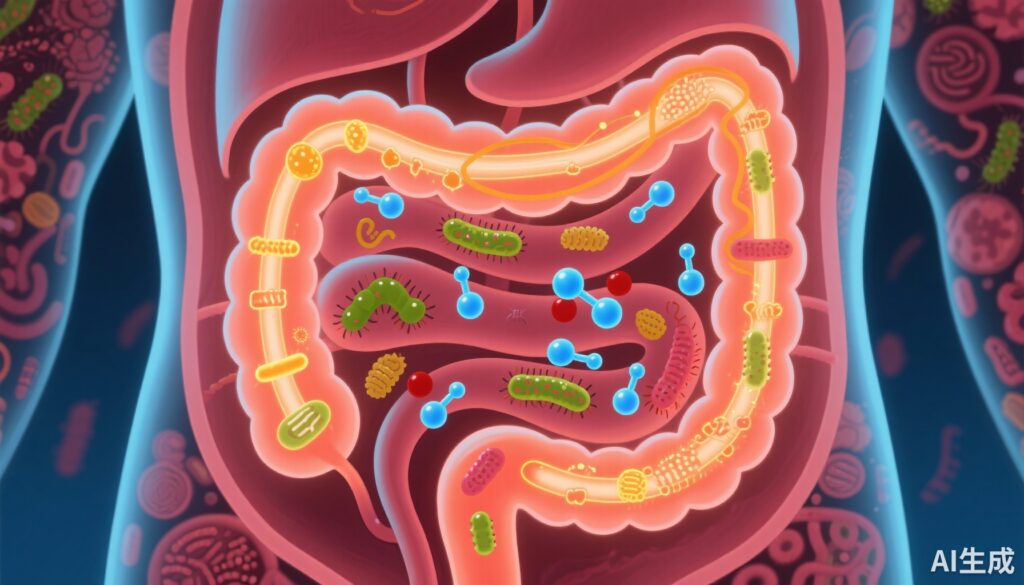Highlight
This exploratory randomized crossover trial reveals that short-term variations in energy intake markedly influence fecal serotonin concentrations, gut microbiome-derived tryptophanase gene abundance, and parameters of energy absorption including digestible and metabolizable energy. Specifically, overfeeding was associated with increased energy absorption but paradoxically decreased fecal serotonin and tryptophanase, which correlated positively with Bacteroides abundance. These findings suggest a dynamic gut-microbiome-host interaction modulating energy utilization that may have implications for metabolic regulation.
Study Background and Disease Burden
The growing prevalence of metabolic disorders, including obesity and related complications, underlines the importance of understanding how dietary energy intake affects host metabolism. The gut microbiome, with its vast enzymatic repertoire, notably tryptophanase activity involved in tryptophan metabolism, has emerged as a key modulator of host energy homeostasis. Serotonin, primarily produced in the gut, influences gut motility, secretion, and systemic metabolic processes. However, the relationship between short-term dietary energy fluctuations, gut microbial enzymatic function (tryptophanase), fecal serotonin levels, and energy absorption remains poorly characterized. Addressing these mechanistic links is essential for elucidating pathways that underlie nutritional regulation and metabolic health.
Study Design
This exploratory randomized crossover trial involved 15 healthy adult participants who underwent three distinct 8-day dietary interventions: overfeeding, control (eucaloric), and underfeeding. The study systematically varied energy intake to investigate its acute effects on gut microbial function, fecal serotonin, and energy absorption. Energy absorption was quantified through digestible and metabolizable energy measurements analyzed via bomb calorimetry of dietary intake and fecal outputs. Fecal serotonin concentrations were determined by liquid chromatography–tandem mass spectrometry (LC-MS/MS). Gut microbiota composition and functional gene abundance, including tryptophanase (EC 4.1.99.1) genes, were assessed using both 16S rRNA gene sequencing and metagenomic shotgun analysis. Gut transit time was also measured as a physiological parameter potentially influencing absorption.
Key Findings
Energy Absorption and Transit Time: Overfeeding significantly increased digestible energy (p < 0.001), with values notably higher than in the control condition (p = 0.032). Metabolizable energy and gut transit time also increased significantly during overfeeding compared with both control (metabolizable energy: p = 0.001; gut transit time: p = 0.014) and underfeeding (metabolizable energy: p < 0.001; gut transit time: p = 0.004) conditions, suggesting enhanced nutrient uptake coupled with altered gastrointestinal motility or transit dynamics under higher energy load.
Fecal Serotonin Levels: Contrary to expectations, fecal serotonin concentrations were significantly lower in the overfeeding condition than in control (p = 0.005) and underfeeding (p < 0.001) conditions. This inverse relationship suggests that serotonergic signaling in the gut may downregulate in states of energy surplus, possibly as a regulatory adaptation to modify gut motility, secretion, or absorption efficiency.
Tryptophanase Gene Abundance and Microbiome Composition: Tryptophanase gene abundance varied significantly among dietary states (p = 0.0019), with overfeeding yielding lower abundance compared to underfeeding (p = 0.001). This enzyme, critical for microbial degradation of tryptophan to indole and related metabolites, correlated strongly with the abundance of Bacteroides species across all conditions (correlation coefficients 0.696–0.896), highlighting a key microbial contributor to tryptophan metabolism responsive to dietary energy load.
Associations Between Serotonin and Energy Absorption: Analysis of intra-individual variability revealed a significant negative association between fecal serotonin levels and digestible energy absorption (β = –0.077, p = 0.019), implying that reductions in serotonin may facilitate increased energy extraction from the diet.
Collectively, these results indicate that short-term energy intake modulates gut microbiome functionality and host biochemical outputs in a coordinated manner that can influence the efficiency of nutrient assimilation.
Expert Commentary
This study provides compelling evidence of the fast and dynamic interplay between dietary intake, gut microbial enzymatic activity, and host metabolic signaling molecules such as serotonin. The observed decrease in fecal serotonin despite increased energy intake challenges simplistic models that posit a direct correlation between food intake and gut serotonin production. Instead, it supports the hypothesis of an adaptive mechanism potentially aimed at optimizing nutrient absorption under caloric surplus.
Lower tryptophanase gene abundance in overfeeding states may reflect shifts in microbial community structure or metabolic priorities, possibly favoring energy extraction pathways less reliant on tryptophan metabolism. The robust relationship between tryptophanase and Bacteroides aligns with prior literature highlighting this genus’s versatility in nutrient processing.
Limitations: The small sample size limits generalizability, and short intervention periods preclude understanding of long-term adaptations. Additionally, fecal measurements represent distal gut processes and may not fully capture proximal intestinal events. The study design does not establish causality but demonstrates important associative patterns warranting further mechanistic investigation.
Conclusion
Short-term dietary energy loads significantly influence fecal serotonin levels, gut microbiome tryptophanase gene abundance, and energy absorption metrics, suggesting a tightly interconnected network modulating host metabolism. These findings open avenues for modulating the gut microbiome and serotonergic pathways as potential therapeutic targets to optimize energy balance and metabolic health. Future studies should explore longitudinal effects, diverse populations, and mechanistic pathways integrating microbial metabolism with host physiology.
References
Yoshimura E, Hamada Y, Hatamoto Y, Nakagata T, Nanri H, Nakayama Y, Iwasaka C, Hayashi T, Suzuki I, Ando T, Ishikawa-Takata K, Tanaka S, Ono R, Araki M, Kawashima H, Chen YA, Park J, Hosomi K, Mizuguchi K, Kunisawa J, Miyachi M. Effect of short-term dietary intervention on fecal serotonin, gut microbiome-derived tryptophanase, and energy absorption in a randomized crossover trial: an exploratory analysis. Gut Microbes. 2025 Dec;17(1):2514137. doi: 10.1080/19490976.2025.2514137. Epub 2025 Jun 9. PMID: 40488306; PMCID: PMC12150606.


